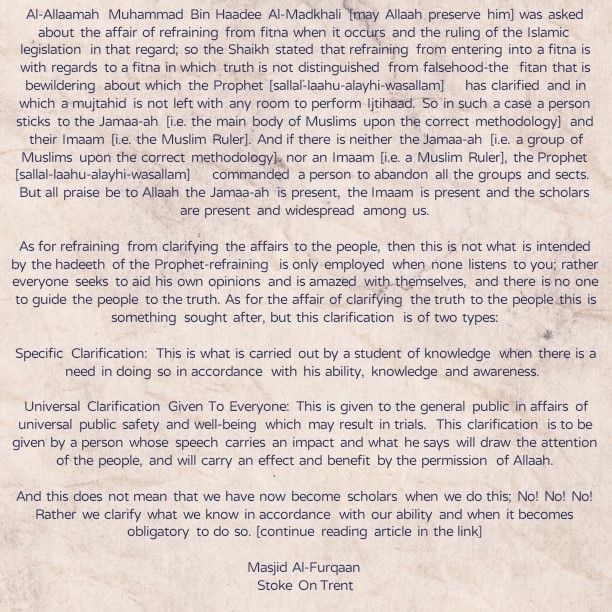[2] Fatawaa Regarding Women: The Ruling on the statement of woman who says, whilst sitting or standing, Yaa Rasoolal-laah! Or Yaa Abdal Qaadir!
The ruling on the statement of a woman who, whilst standing up, says: Yaa Rasoolal-laah (O Messenger of Allaah!) or a similar (statement)
Question:
A Muslim testifies that none has the right to be worshipped except Allaah and that Muhammad (sallal-laahu-alayhi-wasallam) is the Messenger of Allaah; but when standing up or sitting down, he/she says, ‘’Yaa Rasoolal-laah (O Messenger of Allaah!) or Yaa Abal Qaasim (O Abu Qaasim!), or Yaa Abdal Qaadir (O Abdul Qaadir!), or what similar to these statements of Al-Isti’aanah (i.e. seeking aid and assistance). What is the ruling on this?
Answer:
A person calling (i.e. invoking) the Messenger of Allaah (sallal-laahu-alayhi-wasallam) or other than him, such as Abdul Qaadir Al-Jaylaani or Ahmad At-Tijaani, when standing up or sitting down, and seeking assistance in that (action), or what is similar to this, in order to receive a benefit or repel harm, is a type of Shirk Akbar that was widespread during the Pre-Islamic era of ignorance. So Allaah (The Most High) sent His Messenger (sallal-laahu-alayhi-wasallam) to put an end to it; save the people from it; guide the people to single out Allaah in worship and in supplication. That is because Al-Isti’aanah (seeking aid and assistance) is an act of worship and whoever performs it for other than Allaah is a Mushrik. [1]
Allaah (The Most High) has directed and taught His slaves to say:
[إِيَّاكَ نَعْبُدُ وَإِيَّاكَ نَسْتَعِينُ -You (Alone) we worship, and You (Alone) we ask for help (for each and everything)] [1:5]
Allaah (The Most High) said: وَأَنَّ الْمَسَاجِدَ لِلَّهِ فَلَا تَدْعُوا مَعَ اللَّهِ أَحَدًا
And the mosques are for Allah (Alone), so invoke not anyone along with Allah. [72:18]
Allaah (The Most High) has clarified that He (alone) controls harm and benefit; He alone removes harm and bestows blessings; He alone is the one who bestows good upon His slaves and preserves it for them. None can deny that which Allaah gives and none can bestow that which Allaah withholds. None can prevent what He has decreed and He is able to do all things. Allaah (The Most High) said:
وَلَا تَدْعُ مِن دُونِ اللَّهِ مَا لَا يَنفَعُكَ وَلَا يَضُرُّكَ ۖ فَإِن فَعَلْتَ فَإِنَّكَ إِذًا مِّنَ الظَّالِمِينَ
وَإِن يَمْسَسْكَ اللَّهُ بِضُرٍّ فَلَا كَاشِفَ لَهُ إِلَّا هُوَ ۖ وَإِن يُرِدْكَ بِخَيْرٍ فَلَا رَادَّ لِفَضْلِهِ ۚ يُصِيبُ بِهِ مَن يَشَاءُ مِنْ عِبَادِهِ ۚ وَهُوَ الْغَفُورُ الرَّحِيمُ
“And invoke not besides Allah, any that will neither profit you, nor hurt you, but if (in case) you did so, you shall certainly be one of the Zalimun (polytheists and wrong-doers). ” And if Allah touches you with hurt, there is none who can remove it but He; and if He intends any good for you, there is none who can repel His Favour which He causes it to reach whomsoever of His slaves He will. And He is the Oft-Forgiving, Most Merciful. [10:106-107]
Allaah (The Most High) said:
يُولِجُ اللَّيْلَ فِي النَّهَارِ وَيُولِجُ النَّهَارَ فِي اللَّيْلِ وَسَخَّرَ الشَّمْسَ وَالْقَمَرَ كُلٌّ يَجْرِي لِأَجَلٍ مُّسَمًّى ۚ ذَٰلِكُمُ اللَّهُ رَبُّكُمْ لَهُ الْمُلْكُ ۚ وَالَّذِينَ تَدْعُونَ مِن دُونِهِ مَا يَمْلِكُونَ مِن قِطْمِيرٍ
إِن تَدْعُوهُمْ لَا يَسْمَعُوا دُعَاءَكُمْ وَلَوْ سَمِعُوا مَا اسْتَجَابُوا لَكُمْ ۖ وَيَوْمَ الْقِيَامَةِ يَكْفُرُونَ بِشِرْكِكُمْ ۚ وَلَا يُنَبِّئُكَ مِثْلُ خَبِيرٍ
He merges the night into the day (i.e. the decrease in the hours of the night are added to the hours of the day), and He merges the day into the night (i.e. the decrease in the hours of the day are added to the hours of the night). And He has subjected the sun and the moon, each runs its course for a term appointed. Such is Allah your Lord; His is the kingdom. And those, whom you invoke or call upon instead of Him, own not even a Qitmir (the thin membrane over the date-stone). If you invoke (or call upon) them, they hear not your call, and if (in case) they were to hear, they could not grant it (your request) to you. And on the Day of Resurrection, they will disown your worshipping them. And none can inform you (O Muhammad) like Him Who is the All-Knower (of each and everything). [35:13-14]
Allaah (The Most high) said:
وَمَنْ أَضَلُّ مِمَّن يَدْعُو مِن دُونِ اللَّهِ مَن لَّا يَسْتَجِيبُ لَهُ إِلَىٰ يَوْمِ الْقِيَامَةِ وَهُمْ عَن دُعَائِهِمْ غَافِلُونَ
وَإِذَا حُشِرَ النَّاسُ كَانُوا لَهُمْ أَعْدَاءً وَكَانُوا بِعِبَادَتِهِمْ كَافِرِينَ
And who is more astray than one who calls (invokes) besides Allah, such as will not answer him till the Day of Resurrection, and who are (even) unaware of their calls (invocations) to them? And when mankind are gathered (on the Day of Resurrection), they (false deities) will become enemies for them and will deny their worshipping. [46:5-6]
Allaah (The Most High) said:
وَمَن يَدْعُ مَعَ اللَّهِ إِلَٰهًا آخَرَ لَا بُرْهَانَ لَهُ بِهِ فَإِنَّمَا حِسَابُهُ عِندَ رَبِّهِ ۚ إِنَّهُ لَا يُفْلِحُ الْكَافِرُونَ
And whoever invokes (or worships), besides Allah, any other ilah (god), of whom he has no proof, then his reckoning is only with his Lord. Surely! Al-Kafirun (the disbelievers in Allah and in the Oneness of Allah, polytheists, pagans, idolaters, etc.) will not be successful. [23:117]
In these verses Allaah (The Most High) says that it is disbelief and polytheism to invoke others besides Him. He informed (us) that there is none more astray than the one who invokes others besides Him.
The Prophet (sallal-laahu-alayhi-wasallam) said to Ibn Abbaas (radiyallaahu-anhuma): [إذا سألت فاسأل الله واذا استعنت فاستعن بالله– If you ask (i.e. supplicate), then ask Allaah. And if you seek help, then seek help from Allaah] [Saheeh Al-Jaami 7957]
The Prophet (sallal-laahu-alayhi-wasallam) also said: [الدعاء هو العبادة] [Supplication is an (act) of worship] [Saheeh Al-Jaami 3407]
[Source: Fataawa Al-Najnah Ad-Daa-imah 1/163. Abridged]
———————————————————————————————-
[1] See link below: The Principles of Takfir – Salafi Publications
http://www.spubs.com/sps/sp.cfm?secID=MNJ&subsecID=MNJ09&loadpage=displaysubsection.cfm
Abu Mu’aawiyah (Abdullaah Al-Gambi)
